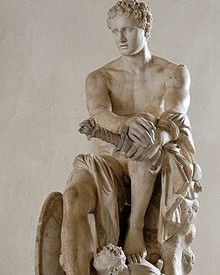Ares Goes on Trial: The Day the God of War Was Judged

In Greek mythology, Ares was the god of war. He loved battles, fighting, and the chaos of war. Unlike his sister Athena, who was wise and strategic, Ares was wild and aggressive. Many gods and mortals didn’t like him because he often caused destruction without thinking about the consequences.
But did you know that there was a time when Ares himself was put on trial? Yes, even the mighty god of war had to face judgment! This story is special because it was the first trial in Greek mythology, and it took place on a hill in Athens, which later became a real court called the Areopagus.
Let’s dive into the story of how Ares ended up on trial and what happened next!
Why Was Ares Put on Trial?
The story begins with Ares’ daughter, Alcippe. She was a beautiful and kind young woman, but one day, something terrible happened.
A man named Halirrhothius, who was the son of Poseidon, the god of the sea, tried to harm Alcippe. He wanted to take her away against her will. But before he could do anything, Ares arrived just in time to protect his daughter.
Ares was furious. He couldn’t let anyone harm his child, so he attacked Halirrhothius and killed him. This might sound like justice, but in ancient Greek laws, killing—even for revenge—was a serious crime. Poseidon was angry that his son was dead, so he demanded that Ares be put on trial for murder.
Even though Ares was a powerful god, he had to follow the rules like everyone else. The gods decided to hold a trial on a special hill in Athens, where Ares would defend himself.
The First Trial in History
The trial of Ares took place on a rocky hill in Athens, which later became known as the Areopagus (meaning “Hill of Ares”). This hill later became an important place for real trials in ancient Greece.
The judges of the trial were twelve of the Olympian gods, including Zeus, Athena, and Apollo. Poseidon, still angry over the loss of his son, stood against Ares, demanding justice.
Ares, however, did not deny what he had done. He admitted that he had killed Halirrhothius but argued that he had done it to protect his daughter. He asked the gods:
“If a father cannot defend his child from harm, then what kind of justice is that?”
The gods listened carefully. Some believed that Ares had the right to defend his daughter, while others thought that he had acted too violently.
The Verdict: Was Ares Guilty?
After much debate, the gods made their decision. They declared Ares innocent because they believed that he had acted out of love and protection, not cruelty.
This trial was important because it set a new idea in Greek mythology: Justice should not be about power, but about fairness. The Areopagus hill later became a real-life court in Athens, where people were judged fairly, just like Ares was.
Ares, though usually seen as a reckless god, had proven that even the god of war could show love and responsibility.
What Can We Learn from This Story?
The trial of Ares teaches us many important lessons:
Even the powerful must follow the law – Ares was a god, but he still had to go on trial, showing that justice is for everyone, no matter how powerful they are.
Justice must be fair – Ares was judged not just by his past actions but by the reason behind his actions. Intentions matter when deciding right and wrong.
Protecting others is important – Ares’ story reminds us that standing up for those who cannot protect themselves is a noble thing.
Violence should not always be the first answer – Even though Ares won his trial, his actions were questioned because he acted in anger rather than thinking first. This teaches us that sometimes, there are better ways to solve problems than fighting.
Why This Story Is Still Important
Even today, courts and trials help people solve problems fairly. The Areopagus hill in Athens became a real-life place for trials where judges decided cases just like in Ares’ story. This myth shows how the ancient Greeks believed in justice, fairness, and protecting the innocent.
While Ares is mostly known for being a god of war, this story reveals a different side of him—a father who loved his daughter and was willing to defend her. It also shows that even gods had to follow the rules, proving that no one is above justice.
So, the next time you think of Ares, remember—he wasn’t just about war and battles. He was also a father, a protector, and someone who believed in standing up for what was right.